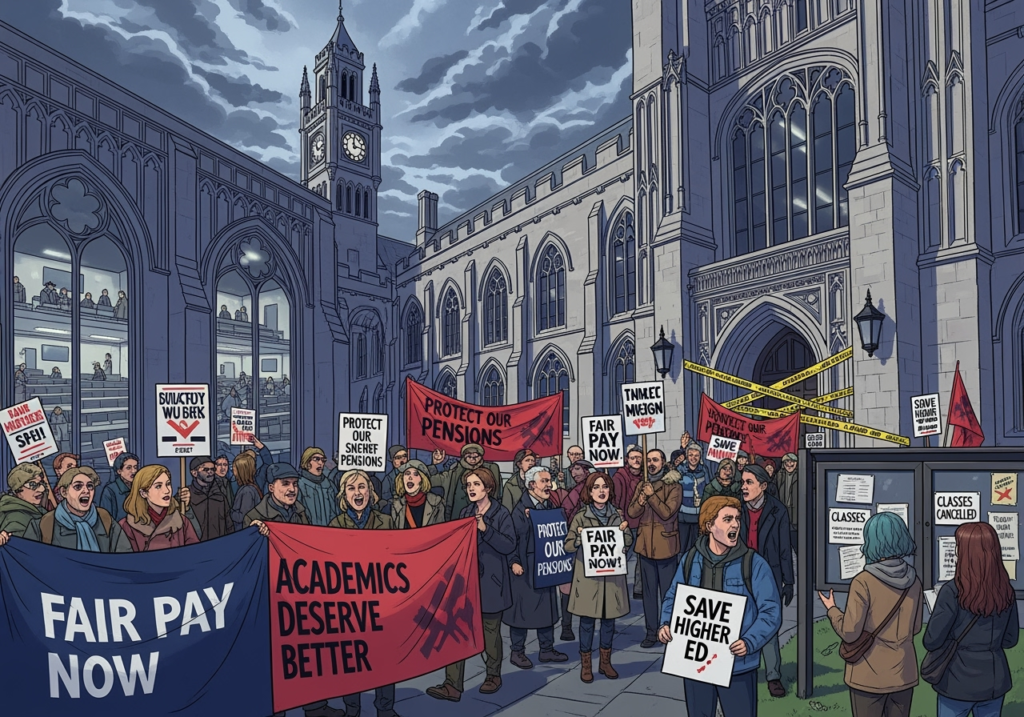UK universities hit by strike action over pay and pensions

Latest round in bitter dispute will affect campuses across England, Scotland and Northern Ireland
Richard Adams, Education editor
Tue 30 Nov 2021 18.30 GMT
More than a million students will be hit by three days of strikes on campuses across England, Scotland and Northern Ireland starting on Wednesday, in the latest round of an increasingly bitter dispute in which university leaders have accused leftwingers within the University and College Union (UCU) of blocking progress over a possible deal.
Fifty-eight universities will be affected where staff backed a ballot on strike action called by the UCU, halting lectures and tuition at the country’s largest universities, including the Open University and University College London.
In Greater Manchester alone, more than 100,000 postgraduate and undergraduate students will have their studies disrupted, with strikes taking place at the University of Manchester, Manchester Metropolitan and Salford universities, as well as the Royal Northern College of Music.
The dispute is in part over the management and financing of the University Superannuation Scheme (USS), which provides pensions to the UK’s older universities as well as research institutes and academic thinktanks. The two sides are also battling over low pay and issues such as insecure fixed-term contracts used to employ an increasing number of teaching staff.
In a statement issued on the eve of the strike, Universities UK (UUK) – which represents the employers in the pensions talks – argued that the strike was supported by only a minority of staff, and that the UCU’s leadership was being attacked by leftwingers.
UUK, the umbrella body of universities in England, Scotland, Wales and Northern Ireland, said a potential deal over pensions had been undermined by the union’s own negotiators, whom it described as “members of the influential UCU Left faction”, saying that there was “a pattern of checks on the UCU leadership by UCU Left, who are affiliated with the Socialist Workers party”.
“With such divisions in UCU’s decision-making bodies, it is difficult to see how a negotiated settlement over USS could ever be possible,” UUK said in its statement.
In response, a UCU spokesperson said: “It is beyond disappointing that just as 50,000 university staff are set to walk out on strike UUK has decided to spend its time targeting individual UCU members.
“Instead of engaging in desperate 11th-hour deflection tactics intended to undermine the strikes, UUK should come clean about the true impact of its pension cuts. After witnessing this bizarre intervention from UUK, students and staff will quite rightly ask why vice-chancellors are allowing their representative body to run amok instead of negotiating positively to resolve yet another dispute in the sector.”
But vice-chancellors are showing no signs of compromising, with some angry at the union’s actions and the failure of negotiations. “I don’t care if it’s bloody, as long as the blood spills within the union,” said one vice-chancellor.
According to UUK, the revisions to pensions on retirement amounted to cuts of 10% and 18% required for the fund to remain financially sound. But the union says its own modelling – prepared by an independent firm – shows a typical lecturer on an annual wage of £39,000 would face a cut to their defined and guaranteed benefits of 35%, while a model published by the USS trustees shows an even deeper 41% cut in future benefits.
Jo Grady, the UCU’s general secretary, said: “Not only have UUK been wrongly criticising UCU’s own projections of the scale of their pension cuts, but they have also adopted wild underestimates of their own, which have been repeated by vice-chancellors at universities up and down the UK in communications to their staff.
“It is beyond a disgrace that senior managers in our universities have been attempting to persuade staff from acting to stop cuts to their retirement with information that is wrong and which emanated right from the top of UK.”
UCU also said re-balloting on strike action would take place at 42 universities where the ballot failed by only narrow margins, and that strikes would continue into the new year.
While most of the universities involved voted to strike on both the pensions and pay ballots, others only meet the conditions on the pay ballot, while a handful including Imperial College London are striking solely over pensions.
University leaders and ministers have said the strike will bring further disruption to students who have missed months of in-person teaching and the use of facilities such as libraries because of the closure of campuses during the pandemic.
The National Union of Students and a number of campus student unions have supported the strike. A poll of students conducted by the NUS this month found that 73% backed UCU’s action while 9% opposed it.





















